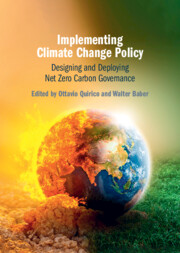Book contents
- Implementing Climate Change Policy
- Implementing Climate Change Policy
- Copyright page
- Additional material
- Dedication
- Contents
- Contributors
- Abbreviations
- Introduction
- Part I Comparing Climate Policies
- 1 The Earth’s Climate and Ongoing Global Change
- 2 Building Blocks of the European Union’s Strategy for Climate Neutrality
- 3 Environmental Constitutionalism
- 4 Avoiding Russia’s Sphere of Influence: The European Union, Energy Supply and Climate Sustainability
- 5 The USA and Climate Policies
- 6 Great Expectations
- 7 What Does ‘Green’ Mean for a Green Belt and Road?
- 8 Embracing Complexity: Water and Climate Policy in the Middle East and North Africa
- 9 Between Europe and the People’s Republic of China: Understanding Africa’s Energy Transition
- Part II Designing Effective Governance Mechanisms
- Conclusion
- Documents
- Cases
- Bibliography
- Index
6 - Great Expectations
Challenges to the Implementation of Climate Policies in Latin America and the Caribbean
from Part I - Comparing Climate Policies
Published online by Cambridge University Press: 22 November 2024
- Implementing Climate Change Policy
- Implementing Climate Change Policy
- Copyright page
- Additional material
- Dedication
- Contents
- Contributors
- Abbreviations
- Introduction
- Part I Comparing Climate Policies
- 1 The Earth’s Climate and Ongoing Global Change
- 2 Building Blocks of the European Union’s Strategy for Climate Neutrality
- 3 Environmental Constitutionalism
- 4 Avoiding Russia’s Sphere of Influence: The European Union, Energy Supply and Climate Sustainability
- 5 The USA and Climate Policies
- 6 Great Expectations
- 7 What Does ‘Green’ Mean for a Green Belt and Road?
- 8 Embracing Complexity: Water and Climate Policy in the Middle East and North Africa
- 9 Between Europe and the People’s Republic of China: Understanding Africa’s Energy Transition
- Part II Designing Effective Governance Mechanisms
- Conclusion
- Documents
- Cases
- Bibliography
- Index
Summary
The Latin America and the Caribbean (LAC) region is a distinct geographic, economic and cultural area with a distinct place in the climate change landscape. Climate policy implementation to meet such Paris Agreement commitments is still incipient, with some of its countries serving as models, some as laggards and the rest positioned somewhere in between. For this reason, partnerships with regions that have advanced more in this area can prove useful. The European Union (EU)–Community of Latin American and Caribbean States (CELAC, per the acronym in Spanish) summits and the Euroclima programme are two examples. Due to its high levels of inequality and social unrest, the key challenge to implementing climate policies in LAC will be the strengthening of a political atmosphere where human rights, the rule of law and democratic values prevail.
Keywords
- Type
- Chapter
- Information
- Implementing Climate Change PolicyDesigning and Deploying Net Zero Carbon Governance, pp. 94 - 111Publisher: Cambridge University PressPrint publication year: 2024

